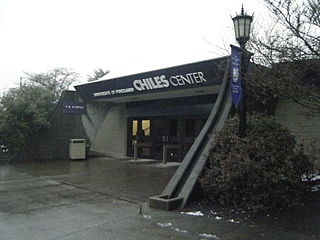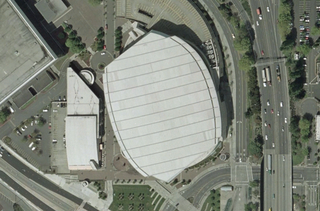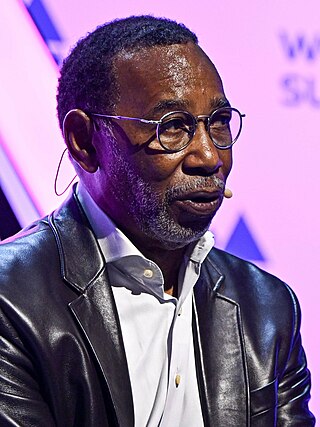
The Portland Trail Blazers are an American professional basketball team based in Portland, Oregon. The Trail Blazers compete in the National Basketball Association (NBA) as a member of the Northwest Division of the Western Conference. The team played its home games in the Memorial Coliseum before moving to the Moda Center in 1995. The franchise entered the league as an expansion team in 1970, and has enjoyed a strong following: from 1977 through 1995, the team sold out 814 consecutive home games, the longest such streak in American major professional sports at the time, and which has only since been surpassed by the Boston Red Sox and the Dallas Mavericks. The Trail Blazers are the only NBA team based in the Pacific Northwest, after the Vancouver Grizzlies relocated to Memphis and became the Memphis Grizzlies in 2001 and the Seattle SuperSonics relocated to Oklahoma City and became the Oklahoma City Thunder in 2008.

Moda Center, formerly known as the Rose Garden, is the primary indoor sports arena in Portland, Oregon, United States. It is used for basketball, ice hockey, rodeos, circuses, conventions, ice shows, concerts, and dramatic productions. The arena has a capacity of 19,393 spectators when configured for basketball. It is equipped with state-of-the-art acoustics and other amenities.

The Salt Lake City Stars are an American minor-league professional basketball team. They are a member of the NBA G League, based in West Valley City, Utah, and are affiliated with the Utah Jazz. Before the 2016-17 season, they were based in Boise, Idaho. Playing their home games at the Maverik Center, the Stars serve as a developmental platform for aspiring basketball players.

The Veterans Memorial Coliseum is an indoor arena located in the oldest part of the Rose Quarter area in Portland, Oregon. The arena is the home of the Portland Winterhawks, a major junior ice hockey team, and was the original home of the Portland Trail Blazers of the National Basketball Association. It has been included on the National Register of Historic Places in recognition of its architectural significance.

William W. Schonely, nicknamed "The Schonz", was an American sports broadcaster who was the play-by-play announcer for the Portland Trail Blazers for almost three decades, from the team's launch in 1970 until 1998. A native of Pennsylvania, he worked in radio in Louisiana and Seattle before settling in Portland, Oregon. In addition to his work for the Blazers, he was a sportscaster for Major League Baseball games, several minor league baseball teams, college sports, National Hockey League games, and junior ice hockey.

Christen Guilford Dudley is an American former professional basketball player and politician. He played 886 games across 16 seasons in the NBA for the Cleveland Cavaliers, New Jersey Nets, Portland Trail Blazers, New York Knicks, and Phoenix Suns. A journeyman center, he was known primarily for his defensive skill as a rebounder and shot blocker. In his second season with the Knicks, he played in the 1999 NBA Finals.
Kevin Lee Pritchard is an American basketball executive, and a former player and coach, who is currently the president of basketball operations for the Indiana Pacers. Pritchard played 4 seasons in the NBA as a player, and was also the general manager of the Portland Trail Blazers, and the Indiana Pacers.

The Earle A. & Virginia H. Chiles Center is a 4,852-seat multi-purpose arena in Portland, Oregon, USA. The arena opened in 1984. It is home to the University of Portland Pilots men's and women's basketball teams as well as the women's volleyball team. It hosted the West Coast Conference men's basketball tournament in 1992 and 2007. Starting with the 2023–2024 season, the Chiles Center hosts the Portland Trail Blazers' NBA G League team, the Rip City Remix.

LaMarcus Nurae Aldridge is an American former professional basketball player. He played college basketball for two seasons with the Texas Longhorns. Aldridge was selected second overall in the 2006 NBA draft. After spending nine seasons with the Portland Trail Blazers, he signed with the San Antonio Spurs in 2015. In March 2021, he signed with the Brooklyn Nets after the Spurs bought out his contract. He retired after two weeks due to an irregular heartbeat, but returned to the Nets the following season after receiving medical clearance.
Teufel Nursery is a family-owned landscaping company based in Hillsboro, Oregon, United States. Founded in 1890, the company maintains existing and installs new landscaping for commercial, government, and residential customers. The company has about 200 employees. It was based in Portland until the 1940s, then in the unincorporated Cedar Mill area until 2007. Its headquarters have been in eastern Hillsboro since fall 2011.
Ronald T. Murphy is a retired American basketball player. Born in Dover, Delaware, Murphy played one season in the National Basketball Association (NBA) for the Portland Trail Blazers. He was drafted by Portland in the first round of the 1987 NBA draft out of Jacksonville University, where he played for four years. Listed at 6 feet 5 inches (1.96 m) and 235 pounds (107 kg), Murphy played one season in the NBA (1987–88) as a guard-forward appearing in a total of 18 games with an average of 2.0 points 0.6 rebounds per game. His rookie season ended after he fractured his fifth metatarsal bone during a practice in March 1988.
The Oregon Lottery is run by the government of the U.S. state of Oregon. It is a member of the Multi-State Lottery Association (MUSL).

The Rose Quarter is a 30-acre (12-hectare) sports and entertainment district located in Portland's Lloyd District on the east bank of the Willamette River, just east of downtown. The Rose Quarter is bounded on the west by NE Interstate Avenue, on the north by NE Broadway and NE Weidler Streets, on the east by Interstate 5, and on the south by NE Holladay Street. The site contains two multipurpose arenas, the Moda Center and the Memorial Coliseum. Nearby landmarks include the Steel and Broadway bridges, the Oregon Convention Center, and the Eastbank Esplanade.
The Portland Trail Blazers are a professional basketball team in the Western Conference of the National Basketball Association. The Trail Blazers are currently celebrating their 50th NBA season. The franchise owner is Jody Allen, who assumed ownership upon the death of her brother Microsoft co-founder and Vulcan Inc. chairman Paul Allen, in 2018.

Larry G. Miller is an American business executive for Nike, Inc. He spent five years as the team president of the Portland Trail Blazers in the National Basketball Association (NBA). In his memoir, Jump: My Secret Journey From the Streets to the Boardroom, Miller writes that he was involved in a gang when he was 16, committing the murder of another teenager.
NBC Sports Northwest was an American regional sports network owned by the NBC Sports Group unit of NBCUniversal, as an affiliate of NBC Sports Regional Networks. The network broadcast regional coverage of professional sports events throughout the Pacific Northwest, focusing primarily on the NBA's Portland Trail Blazers and college sports events involving the Oregon Ducks. It also covered other sports events involving teams within the northwestern United States, including those featuring college and high school teams.
The 2009–10 Portland Trail Blazers season was the 40th season of the franchise in the National Basketball Association (NBA). In the playoffs, the Trail Blazers lost to the Phoenix Suns in six games in the First Round.
There are several well-known and commonly used nicknames referring to Portland, Oregon.

Moda Health is a health insurance company based in Portland, Oregon. The company provides medical and dental insurance in Oregon, Alaska and Texas. The Moda Center, a sports arena that is home to the Portland Trail Blazers, and Moda Tower, the tenth-tallest building in Portland, are both named after the company. Moda Health is a member of Delta Dental.











